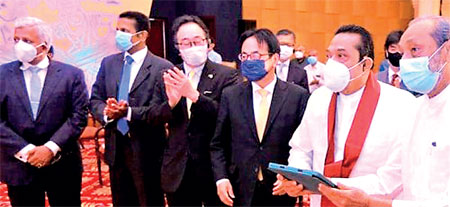Sunday Feb 22, 2026
Sunday Feb 22, 2026
Thursday, 18 November 2021 02:06 - - {{hitsCtrl.values.hits}}
 Prime Minister Mahinda Rajapaksa yesterday said that wastewater management systems currently limited to a few areas would be constructed in every major city in the country in the future.
Prime Minister Mahinda Rajapaksa yesterday said that wastewater management systems currently limited to a few areas would be constructed in every major city in the country in the future.
He made this statement at the inauguration of the ‘Kandy City Wastewater Management Project,’along with the Ambassador of Japan to Sri Lanka Mizukoshi Hideaki, at a ceremony held online between Temple Trees and the newly constructed Gannoruwa Wastewater Treatment Plant in Kandy.
The Prime Minister said that it was a great achievement for the country to be able to create a ‘National Sanitation Plan’ to safeguard the future of the country.
Minister of Water Supply and Drainage Vasudeva Nanayakkara presented to the Prime Minister the National Plan for Sanitation up to 2030, which will work to conserve groundwater, protect the catchment areas and maintain the quality of water flow through sensitive areas.
During the ceremony held at the Gannoruwa Wastewater Treatment Plant in Kandy, the Japan International Cooperation Agency (JICA) handed over vehicles, machinery and equipment of the Kandy Urban Waste Management Project to the National Water Supply and Drainage Board and the Kandy Municipal Council.
Japan has been supporting the water sector in the Kandy region since 2001 by building water supply facilities, including a water purification plant, and improving the drinking water coverage rate, according to the Japanese Embassy.
The construction of the sewage treatment plant and the sanitation facilities have been completed through a loan of approximately 14 billion yen, which was decided in March 2010, and the construction of door-to-door connections to each household is now underway, which is expected to improve the living and sanitation environment through sewage treatment.
Kandy Mayor Kesara Senanayake and General Manager of the Drainage Board Thilina S. Wijetunga signed the Operation and Maintenance Agreement for the Wastewater Treatment Plant.
A documentary on the Kandy Urban Wastewater Management Project was also telecast concurrently with the inauguration ceremony.
Speaking at the occasion, Prime Minister Rajapaksa said Sri Lanka was still at the forefront of sanitation use in the South Asian region.
“However, due to our own activities, many water sources in our country are now being polluted. That is why the Water Supply and Drainage Board formulated a ‘National Sanitation Plan’. Accordingly, we are committed to building wastewater management systems to secure the future.”
Even the developed countries of the world are facing the problem of wastewater management, the Premier said, adding that it was not easy to manage disposal of wastewater from homes, businesses and factories.
Noting that Kandy is a World Heritage City and that the Sacred Tooth Relic, the crown jewel of the entire Buddhist world, resides in Kandy, the Premier pointed out that environmental pollution in Kandy has been on the rise for some time and requested the people’s support to avoid the worsening situation.
“We know that wastewater is being discharged illegally even to the Mahaweli River. Not only that, but many places have also been severely affected by wastewater. Recognising this situation, the ‘Wastewater Management’ project will provide significant assistance to protect the historic Kandy Lake as well as to the Kandy-centric tourism industry,” the Premier said.
“We see the implementation of such a national plan that prioritises the hygiene of the people as a future investment. Our Minister Vasudeva told me that this program would be implemented until 2030. JICA provided the initial funding for the Kandy Urban Wastewater Management Project. We must thank them and the Japanese government.
“Currently we have water management systems only in Municipal Council areas such as Colombo, Dehiwala-Mount Lavinia, Moratuwa, and in cities like Ja-Ela, Ekala and Kurunegala. We have planned to build water management systems in every major city in the country, which is now limited to only few areas.”